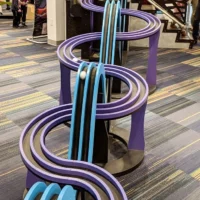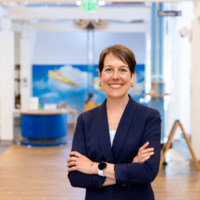Many people’s first introduction to Acton is through its Discovery Museum. This year, the children’s museum is on target to have more than 200,000 visitors—90 percent of them from out of town. In addition, approximately 54,000 students will take part in the museum’s hands-on “Traveling Science Workshops,” which reach 110 towns in eastern Massachusetts and New Hampshire.
The Museum is looking towards a new era as long-time Chief Executive Officer Neil Gordon retires at the end of this month. In a recent interview, Gordon shared his reflections on a decade of transformative growth, increased visibility and accessibility.
Gordon led efforts to consolidate the previous two-building museum into one spacious, state-of-the-art facility, open to young and older children of all abilities. He also directed the creation of “Discovery Woods” to reconnect kids to nature. His latest project was installing solar panels to meet the museum’s electricity needs and foster environmental awareness.
One of Gordon’s goals has been to make the museum a welcoming place for everyone. “If you want to be good for kids,” he says, “you have to be good for all kids.” In 2010, the museum created “Open Door Connections” to expand outreach to families of children on the autism spectrum, with hearing or vision impairments, or with sensory sensitivities, and began to offer free or reduced admission opportunities. Today nearly a third of visitors, including teachers, public assistance card users, military families, and foster families, come to the museum at a discount. In addition, the museum offers free admission to all on the first Friday night of each month during the school year and every Friday night throughout the summer. (4:30 to 8:00 pm. Reservations are required.)
Gordon came to the Discovery Museum from Boston Children’s Museum in 2009. At the time, attendance was down and finances were not strong. During his tenure, operating income tripled, and total assets grew from $1.7 million to $11.7 million. In 2013, he led the museum’s first capital campaign in 30 years, which exceeded its goal by raising $8.8 million, proving the community was willing to invest.
Currently the museum employs 71 staff, mostly part-time, including outdoor educators and a dedicated staff member for community partnerships. It benefits from 100 volunteers a year, ranging from high school students to retired folks as well as corporate outing volunteers.
The mission of the museum, says Gordon, is to get kids ready to be successful, ready for the future. The focus is on basic scientific method—observation, experimentation, and learning from mistakes. “What future person doesn’t need all those skills whether they’re a scientist or not!” he exclaims. “Everybody needs to understand and be comfortable with the science and technology that’s affecting their world. Having an appreciation of science is particularly important in a world where people are denying the validity of science.”
The creation of Discovery Woods in 2013 grew out of concerns about the growing epidemic of childhood obesity and a lack of connection to outdoors and nature. Gordon realized the outdoors was the “perfect exhibit” with natural materials and plenty of opportunity for discovery. Taking advantage of its four-and-one-half acres of open space, the museum built Discovery Woods with an accessible tree house as the centerpiece.
“You want to get kids outside enjoying trees and flowers, digging in the dirt, and finding worms,” says Gordon. “After that, they start to do observation, learn the names of things, learn why worms are out there. Then they progress to saying, ‘That’s something I want to protect and support.’ That’s how you progressively build the next generation of environmental stewards.”
As part of Gordon’s vision to promote environmental sustainability, the museum installed 856 solar panels in 2022. This array not only generates 100% of the electricity needed for the museum, but also enough extra to provide clean energy at a discount to the Acton Housing Authority and four nonprofits.
In 2023, Gordon received numerous awards, citing his strategic vision, innovative work, and outstanding leadership. The most recent was the Lifetime Achievement Award from the New England Museum Association. This past year, he also won the Massachusetts Nonprofit Network Excellence Award, Fred Rogers Institute Helper Award, and Heerwagen Award from the Middlesex Savings Charitable Foundation.
After retirement, Gordon plans to make himself available to other organizations that can benefit from sage management advice. His successor, as of January 1, will be Marie Beam, who has been the museum’s Chief Development Officer for 10 years.



